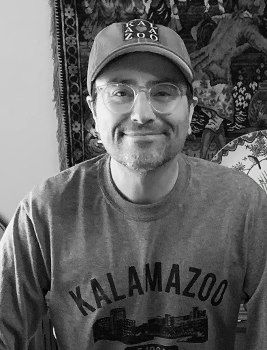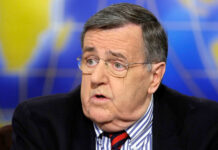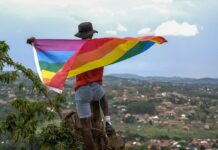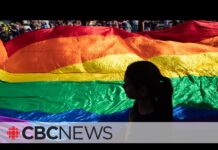Roy Jackson was a school librarian in Atlanta when his work as part of a statewide booklist committee that chose two LGBTQIA+ titles brought traumatizing accusations.
From the fall of 2016 to the spring of 2019, I was honored to serve on the Georgia Children’s Book Award (GCBA) middle grades state committee. I had read and purchased the books longlisted for the award for  my school’s library. The list is also used for a statewide reading bowl program, and I created the first reading bowl team at the Atlanta public school where I first worked as a librarian.
my school’s library. The list is also used for a statewide reading bowl program, and I created the first reading bowl team at the Atlanta public school where I first worked as a librarian.
The GCBA list usually veered toward typical middle grade books, heavy on fantasy and contemporary family archetype characters. Georgia is more than that, with an estimated 4 percent LBGTQIA+ per capita population, ranking eighth in the nation, and I really wanted LGBTQIA+-centered books to make the list.
The committee members, who are educators and librarians from around the state, read and suggest titles to others, and score books on a rubric. Eventually, that exhaustive reading gets narrowed down to a list of books to consider, and we meet for a day of debates, conversations, advocations, and compromise. The committee spends an entire Saturday making that longlist.
As a first-year committee member, I fought hard for representation of my community. In 2017, there were a number of amazing books with LGBTQIA+ characters and storylines that were age appropriate for our target of grades 4-8. At the meeting, I advocated strongly and received support for these titles.  Two age-appropriate LGBTQIA+ books made the list—Richard Peck’s The Best Man, about a kid being in his uncle’s wedding to another man, and Donna Gephart’s Lily & Dunkin, which has a young trans American as one of the two protagonists.
Two age-appropriate LGBTQIA+ books made the list—Richard Peck’s The Best Man, about a kid being in his uncle’s wedding to another man, and Donna Gephart’s Lily & Dunkin, which has a young trans American as one of the two protagonists.
As a young reader in the 1980s, I never saw characters like me. The absence of gay, male teens in books easily led me to believe there was something wrong with me. As a voracious reader, a lack of representation, in my mind, meant I shouldn’t exist. In high school, I came out to my mother and she hid books in the bottom of her desk drawer and told me I could read them if I wanted. Hiding the books told me to hide myself. On the GCBA committee, I had a chance to remedy that for young readers.
I left that day with a feeling of accomplishment. I posted my excitement on social media, and friends and co-workers heard about it ad nauseum. When the list came out, I couldn’t wait to share the titles with my reading bowl team.
Then I opened my work email.
It was flooded.
With hate.
I began to shake a little.
I was afraid of what this meant.
My inbox was filled with email from incensed parents (and some non-parents) from across Georgia demanding a retraction of the two LGBTQIA+ books on the list. It was a precursor to what is going on today with book banning and so-called parental rights.
The emails threatened my job, but the worst ones threatened me with legal action. They called me a pedophile and child pornographer. I truly feared a knock on my door from the police. I texted a dear lawyer friend who crafted a two sentence reply for me, which I used for every email response. While everyone on the committee received emails, I believe I was the only one who was called a pedophile.
Why? Maybe because of a pink shirt I wore in a photo on the website with the committee members’ bios and pictures. Or maybe they found my social media where I am a proudly out American.
The accusation of pedophilia was scary. How could someone accuse me of such a thing because of a booklist? Even today, radical conservatives throw that word around so casually.
There were long-term emotional and psychological consequences of those hateful emails and baseless accusations. The next year, I had no fight left in me and didn’t advocate for LGBTQIA+ books. As a committee, we all were exhausted by the experience and played it safe. That year’s list was inclusive of race, but there were no LGBTQIA+ books.
 With my email free of pedophile accusations and threats of sending the police to my doorstep, I got my fight back for year three. While there wasn’t as many LGBTQIA+ books on my radar as I’d hoped, one book was a standout: George (now titled Melissa) by Alex Gino.
With my email free of pedophile accusations and threats of sending the police to my doorstep, I got my fight back for year three. While there wasn’t as many LGBTQIA+ books on my radar as I’d hoped, one book was a standout: George (now titled Melissa) by Alex Gino.
I’ve always noticed a slight divide in my community regarding the T in our acronym. Because of this, I was so happy to find an age-appropriate, and important, trans representation for young readers in my state. It was a relatable and appropriate book for young readers. The youthful trans experience is pushed far to the margins in our country, even more so today as trans youth are under attack.
The day the committee was scheduled to meet was the same day as the state semifinals for the reading bowl. And guess whose team was in the semifinals? There was no choice to make. I would never let my students down after their hard work. I was confident that the committee, knowing that our booklist is used by the competition, would be willing to reschedule. They weren’t, as I was the only one who could not make it. I sent an email to the chair with two titles, believing that George was a shoe-in.
It wasn’t. My non-LGBTQIA+ second-choice book made the list. I instantly sent an email with my request for reconsideration, but was told no and decided to leave the committee. If I couldn’t see myself represented, I couldn’t represent the committee.
My little protest may seem minor. I know that. But it is significant and meaningful to me. For years, I took things in stride and sucked it up. But this was a time I couldn’t and didn’t. I will never just accept things again. I found a voice, a quiet librarian one, but a voice, nonetheless.
The GCBA longlist, to my knowledge, has not had LGBTQIA+ representation since. I know it’s not because of a lack of titles. There are a plethora of amazing LGBTQIA+ books out there. That makes me want to make my voice louder.
With all this in mind, I felt a shift in me to be more of an activist. While I was unsure what that meant to me, the stars aligned. In 2019, my husband’s job took us north to western Pennsylvania, on the border of Ohio. Approaching a milestone birthday, I was craving change.
Accepted with full funding, I was able to attend the Northeast Ohio Master of Fine Arts consortium creative writing program at Youngstown State University. There, I wrote that book that didn’t exist for me as a teenager—a gay-themed YA title set in the 1980s. Under the guidance of fantastic writers and professors, I have not only given myself that representation I desperately sought as a teen, but created historical fiction for today’s young LGBTQIA+ readers of a time that gets little attention in the YA world. Four excerpts have been published, or are forthcoming, in literary journals, and I have high hopes for the novel to be published.
Then something concerning happened in my state. Pennsylvania was quickly becoming a hotbed for school library book banning and challenges. Almost exclusively, those book challenges were by or about BIPOC and LGBTQIA+ authors and characters. While I watched with deep concern, I was also filled with hope. I saw students fight for their First Amendment rights to access books in their libraries.
While I contemplated what to do next once I graduated with my MFA, I found a natural merge between my desire to see an increase in representation in LGBTQIA+ in YA publishing and a means for young Americans to access those books in their school libraries. I am now in a Ph.D. program at the University of Pittsburgh to research LGBTQIA+ book challenges and banning in school libraries. I am taking interdisciplinary courses in educational law and policy, gender and sexuality studies, literature, and library science.
The goal of my research is to find ways to empower school librarians to combat these unfair challenges and bans and guide them to books that give students representation, visibility, and acceptance. I never thought seeking representation in books would put me on this path, but I am certainly glad it did.
Roy Edward Jackson has been an educator for over 20 years in elementary and higher education. He is currently working on a PhD at the University of Pittsburgh in Information Science, with a focus on LGBTQIA+ book banning in school libraries. He lives in Pennsylvania with his husband.








